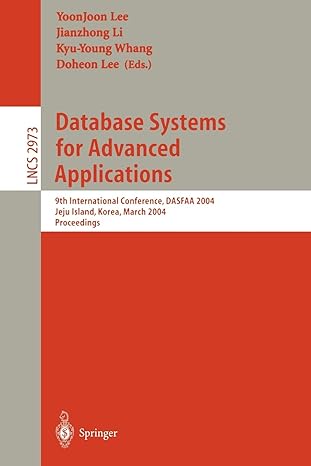Question
This is a continuation of my previous question. I will copy the code we had before. I need a couple of things added. I am
This is a continuation of my previous question. I will copy the code we had before. I need a couple of things added.
I am programming in C using VIM and terminal under Ubuntu Linux.
Here is the previous code:
#include
void main(int argc , char *argv[]) {
// rc is used to store the recieved value of fork int rc;
// variable used to collect status of a program int status;
// pointer to command char *cmd;
// pointers to arguments to command char *myArgv[3];
// if there are three or more arguments like ./program cmd argv1 argv2 ... if (argc >= 3) { cmd = argv[1]; myArgv[ 0 ] = cmd; myArgv[ 1 ] = argv[ 2 ]; myArgv[ 2 ] = NULL; } else { // not enough args we will run ls -al command cmd = "ls"; myArgv[ 0 ] = cmd; myArgv[ 1 ] = "-al"; myArgv[ 2 ] = NULL; }
// Printing the PID of parent process printf("Parent: I am pid %d ", getpid() );
// Here we are forking and creating a child process rc = fork();
if (rc > 0) { // I am the parent
printf("Parent: waiting on pid %d ", rc);
// here we passed the pid of child, and we are waiting till it terminates // the return status is in status variable. waitpid(rc, &status, 0);
if(WIFEXITED(status)) printf("Child's exit code %d ", WEXITSTATUS(status)); else printf("Child did not terminate with exit ");
} else if (rc == 0) { // I am the child
printf("Child: I am pid %d about to exec() %s ", getpid(), cmd); execvp(cmd, myArgv); // control will only return if execvp fails printf("Child: execvp() failed...exiting "); exit(1); } else { // an error occured, no child created errno=EINVAL; perror("Parent: a bad thing happened:"); exit(1); }
return ;
}
I need to have you add a few things. First of all, if someone entered something that was made up like "nosuchprogram" the program should respond with execvp() failed: No such file or directory. It should call perror() and errno needs to be set first. The it should continue. The rest of the program loops.
Any errors from execvp() should be reported with a call to perror()
Step by Step Solution
There are 3 Steps involved in it
Step: 1

Get Instant Access to Expert-Tailored Solutions
See step-by-step solutions with expert insights and AI powered tools for academic success
Step: 2

Step: 3

Ace Your Homework with AI
Get the answers you need in no time with our AI-driven, step-by-step assistance
Get Started


